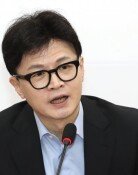Controversies over expanding tax credit for semiconductor industry
Controversies over expanding tax credit for semiconductor industry
Posted July. 29, 2024 07:37,
Updated July. 29, 2024 07:37
Controversy is flaring up over the South Korean government's tax law amendment plan to support the semiconductor industry. The ruling and opposition parties have agreed in a rare joint move to support the industry, but the government has suggested a proposal that lags far behind in terms of scale and duration. Critics say while the government rhetorically emphasizes the 'all-out national semiconductor war,’ it fails to recognize the grave reality of the fierce global chipmaking war.
The Economy and Finance Ministry recently proposed an amendment to the tax law to extend the application period of the tax credit, which reduces corporate taxes for investments in facilities for national strategic technology industries through the K-Chips Act, for another three years from the end of this year. The proposal is a significant step backward from other bills separately proposed by the main opposition Democratic Party of Korea and the ruling People's Power Party to extend the tax credit period for facility investment and R&D investment by 10 years to 2034.
The government has also decided to keep the tax credit rate at 15 percent for large companies and 25 percent for small and medium-sized enterprises only for facility investment. This falls far short of the ruling and opposition parties' proposal to increase the deduction rate by 10 percentage points for both facility and R&D investments. The ruling and opposition parties had also included a provision in their bills that would have allowed the government to pay chipmakers the kind of cash subsidies that rival countries such as the U.S., Japan, and China are paying to chipmakers. Still, the government's proposal also left this out.
The reasoning behind the government's passivity is that Korean semiconductor companies such as Samsung Electronics and SK hynix are already highly competitive and have enough money to fund themselves. The idea is that there is no need for subsidies and long-term tax breaks when state finances are already tight. However, the reality is hardly the case, with SK Group Chairman Chey Tae-won having said, “It costs 20 trillion won (14.4 billion U.S. dollars) to build a semiconductor fab (factory). It is difficult for companies to 'go it alone' as in the past.”
While South Korea hesitates, its competitors have accelerated their support. The U.S. is paying out subsidies of up to 25 percent of the capex investment by Intel, Samsung Electronics, and Taiwan's TSMC. The U.S. has pledged to pay 8.5 to 16 percent of its investment in cash to the companies. The U.S. Semiconductor Act has a 10-year implementation period, allowing companies to plan for the long term. The Japanese government is providing more than 10 trillion won (7.2 billion dollars) to TSMC for the two fabs that the Taiwanese chipmaker is building in Japan.
The South Korean government's tax support measures show no signs of tension, which is seen in the global semiconductor investment race, where countries around the world are fiercely staging by betting on their own economic fate. The ruling and opposition parties should clearly point out problems with the government's proposal during the parliamentary deliberations on the tax law amendment and enact a bold support plan to secure the future of Korean semiconductors.







